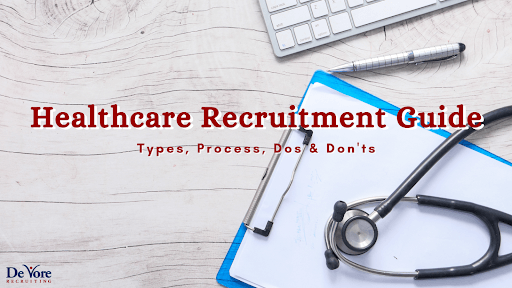De Vore Recruiting is one of the most trusted healthcare recruiters in Los Angeles. We take pride in being a top choice as the resource and provider of professional staff in healthcare facilities and other related workforces.

Elevate Your Team through our Staffing Services

Hire Your Own Recruiter for a Week
This is our most unique service. ‘Hire for a week’ or ‘Pay by the week’ is a simple yet effective hiring solution that many companies benefit from. We provide you with your own Recruiting Headhunter for less than $100 a day helping you save up to 75% on your recruitment expenses!

Healthcare Recruitment
Healthcare recruitment is our main craft. Providing workforce staffing services to many healthcare companies and facilities all around the country. We understand how much of a dynamic pace a healthcare facility could be – and so our healthcare recruitment services can provide you with what you need.

Retained Executive Search
This recruitment service is specialized for a more focus partnership between us and your company. Retained executive search are designed for hiring bigger roles such as seniors, managerial, etc.

Recruitment Process Outsourcing (RPO)
Streamline your recruitment process and reduce hiring time with our RPO service. This service can provide your company with a designated recruiter that will assist you on all your job recruits. Imagine it as a personnel that acts as an extension of your human resources department. He/she is in charge of some or all aspects of the recruitment process.
Tell us what you need
Let us know how our services can help your organization or company.
Tell us what you need.
Our tailored services fit both conventional and unique hiring requirements. While we mainly focus on healthcare staffing, our expertise goes beyond to other industries in the country.
Send us an email.
You can easily connect with us through email! Fill up the form with your information and select which service you are interested to. You can also write us a note to let us know more of what you need.
Wait for our call.
Our team receives a handful amount of inquiries on a daily basis. Rest assured that all your emails are acknowledged and that you are on our list, so please kindly wait for our call.
Why Choose Us?
If you need a quality recruitment service that can provide your organization/company with a tailor-fit solution – then the answer is quite simple. At De Vore Recruiting, our dedication to excellence in healthcare recruiting has made us an incomparable choice from other competitors in the healthcare field.
But our expertise doesn’t stop there; we also extend our exceptional services to cater to other industries with equal precision and care, such as:
- Accounting and Finance
- Sales and Marketing
- Legal
- Hospitality and Restaurant Management
- Small and Local Businesses
Recruitment Solutions for You
We offer high-quality services to find the best employees for your organization following a systematic process from start to finish.
Job Identification and Assessment
One of the most overlooked steps in recruitment is analyzing the needed role to fill in. Our team of recruiting experts believes that evaluating the responsibilities and qualifications required by a company is crucial to finding the perfect candidate.
Smart-sourcing Job Applicants
Unlike other typical recruitment agencies, our recruiting experts do not rely purely on conventional talent sourcing methods. We combine the most innovative and contemporary hiring solutions that have been proven with a track record over years.
Screening Applications
With the two previous steps mentioned above, screening job applicants is rarely a labor for us. This process flows seamlessly because we have a clear understanding of the job/role requirements, and pre-screening usually already happens when we source job seekers.
Interviews and Assessment
We carefully examine each short-listed applicant through a series of interviews, background checks, reference verifications before we match them with hiring companies.
Onboarding Assistance
We can also provide assistance during the onboarding process to make it faster, which includes paperwork, orientation, and training to help the new employee integrate smoothly into the organization.
Latest Guides on Team Management and Recruitment
Employees & Careers Section
Check out our latest job postings below and start your journey towards a rewarding career:







